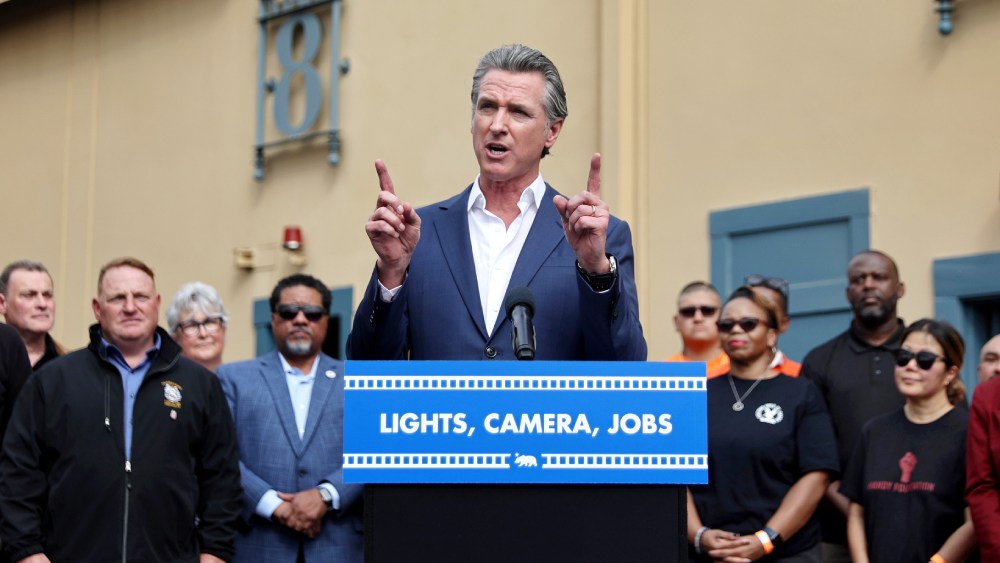Just a day after Donald Trump revealed his plan to impose 100% tariffs on “any and all” films produced in “foreign lands,” California Gov. Gavin Newsom said Monday he wants to collaborate with the president to create a $7.5 billion federal tax incentive to help the film industry.
Many in the industry have pushed for years for a federal film subsidy to counter “runaway production,” as film jobs have been lured by incentives in Canada, the United Kingdom, and elsewhere. In the U.S., tax credit programs are currently offered only at the state level.
“America continues to be a film powerhouse, and California is all in to bring more production here,” Newsom said in a statement to Variety on Monday. “Building on our successful state program, we’re eager to partner with the Trump administration to further strengthen domestic production and Make America Film Again.”
Although Newsom is willing to work with Trump on this new tax incentive, Trump may not be so eager. On Monday, Trump took a shot at the California statesman during an Oval Office press conference, deeming him “grossly incompetent” for allowing the American film industry to slip.
“Our film industry has been decimated by other countries, taking them out,” Trump said. “And also by incompetence. Like in Los Angeles, the governor is a grossly incompetent man. He’s just allowed it to be taken away from, y’know, Hollywood. Hollywood doesn’t do very much of that business.”
Last October, Newsom pledged to increase California’s film incentive from $330 million a year to $750 million. At the time, Newsom suggested that Vice President Kamala Harris, if elected president, might support a federal film incentive. The proposed state expansion is working its way through the state Legislature.
California Sen. Adam Schiff also said Monday that he is working on legislation to implement a federal film incentive, and said he looked forward to working with Republicans on the issue. Hollywood unions would also welcome a tax credit at the national level to compete head-on with other countries.
Newsom’s proposal comes hot on the heels of Trump’s bombshell plan for Hollywood, which would slap heavy tariffs on films produced outside the States. Trump deemed foreign productions a “national security threat” to the American movie industry, not only because they draw filmmakers out to other markets but also bring “messaging and propaganda” into American theaters.
“The Movie Industry in America is DYING a very fast death,” Trump wrote Sunday night in a Truth Social post. “Other Countries are offering all sorts of incentives to draw our filmmakers and studios away from the United States. Hollywood, and many other areas within the U.S.A., are being devastated. This is a concerted effort by other Nations and, therefore, a National Security threat. It is, in addition to everything else, messaging and propaganda! Therefore, I am authorizing the Department of Commerce, and the United States Trade Representative, to immediately begin the process of instituting a 100% Tariff on any and all Movies coming into our Country that are produced in Foreign Lands. WE WANT MOVIES MADE IN AMERICA, AGAIN!”
Shortly after Trump went public with the plan, a White House spokesperson clarified that it was still very much in the development stage, and that no official decisions had been made.
“Although no final decisions on foreign film tariffs have been made, the Administration is exploring all options to deliver on President Trump’s directive to safeguard our country’s national and economic security while Making Hollywood Great Again,” said spokesman Kush Desai.
This did not stop Hollywood from becoming engulfed with outrage and confusion, with many unsure of what to make of Trump’s vague and sweeping proposal. The stock market reacted immediately with widespread dips in the entertainment sector. Lionsgate Studios dropped 4.1%, Warner Bros. Discovery went down 2%, Netflix dipped 1.9% and Paramount declined 1.6%.
Trump’s tariff plan would face numerous legal and practical obstacles. The law he has relied on to impose earlier tariffs, the International Emergency Economic Powers Act, cannot be used to impede the flow of “informational materials” including films.

